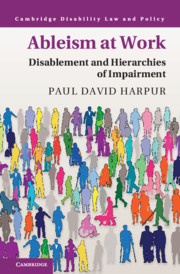Description
Ableism at Work
Disablement and Hierarchies of Impairment
Cambridge Disability Law and Policy Series
Author: Harpur Paul David
This is a comprehensive comparative legal, practical and theoretical analysis of workplace inequalities experienced by workers with psychosocial disabilities.
Language: English
Subject for Ableism at Work:
Approximative price 30.28 €
In Print (Delivery period: 14 days).
Add to cart
Ableism at Work
Publication date: 06-2022
Support: Print on demand
Publication date: 06-2022
Support: Print on demand
Approximative price 120.25 €
In Print (Delivery period: 14 days).
Add to cart
Ableism at Work
Publication date: 12-2019
248 p. · 15.6x23.5 cm · Hardback
Publication date: 12-2019
248 p. · 15.6x23.5 cm · Hardback
Description
/li>Contents
/li>Biography
/li>
The UN Convention on the Rights of Persons with Disabilities promotes ability equality, but this is not experienced in national laws. Australia, Canada, Ireland, the UK and the US all have one thing in common: regulatory frameworks which treat workers with psychosocial disabilities less favorably than workers with either physical or sensory disabilities. Ableism at Work is a comprehensive and comparative legal, practical and theoretical analysis of workplace inequalities experienced by workers with psychosocial disabilities. Whether it be denying anti-discrimination protection to people with episodic disabilities, addictions or other psychological impairments, failing to make reasonable accommodations/adjustments for workers with psychosocial disabilities, or denying them workers' compensation or occupational health and safety protections, regulatory interventions imbed inequalities. Ableism, sanism and prejudice are expressly stated in laws, reflected in judgments, and perpetuated by workplace practices and this book enables advocates, policy makers and lawmakers to understand the wider context in which systems discriminate workers with psychosocial disabilities.
1. Introduction to monograph; 2. International disability norms at work: international law on ableism at work and the hierarchy of impairments; 3. The CRPD Committee, ableism and hierarchies of impairment at work; 4. Hierarchies of impairment at work in the regulation and response to sheltered work; 5. The arbitrary exclusion of episodic and psychosocial disabilities from legal protection: the duration test promoting ableism at work; 6. Ability apartheid at work: the policy of stigmatizing and excluding 'unacceptable' psychosocial disabilities from anti-discrimination laws; 7. Reasonable accommodations in a psychosocial diverse workplace: hierarchies of impairment at work; 8. Using occupational safety and health laws to promote psychological health at work; 9. Sanism and ableism in the law's response to injured workers; 10. Advancing psychosocial diversity using contract and unfair dismissal laws; Index.
Paul David Harpur is Senior Lecturer at the University of Queensland, TC Beirne School of Law. He is a Fulbright Future Scholar hosted by the Harvard Law School Project on Disabilities and the Burton Blatt Institute at Syracuse University. He is also a former duel Paralympian and duel Commonwealth Games representative.
© 2024 LAVOISIER S.A.S.




